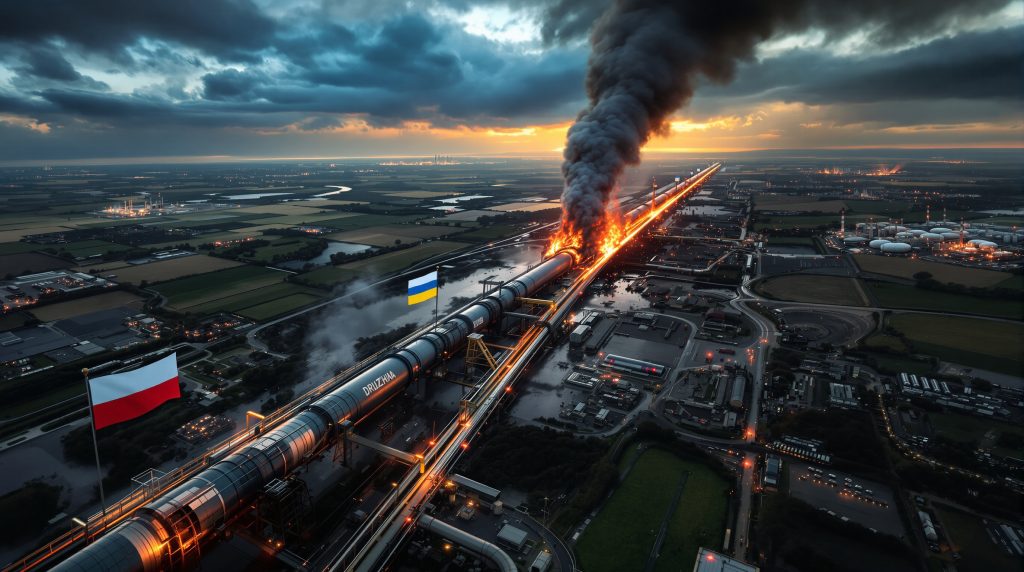How Did Ukraine's Latest Attack Disrupt European Oil Supply?
The recent Ukrainian drone strike on a key section of the Druzhba pipeline has once again halted crude oil flows to Hungary and Slovakia, marking another significant disruption in Europe's energy infrastructure. This strategic attack represents the latest development in the ongoing energy dimension of the Russia-Ukraine conflict, with far-reaching implications for regional energy security and global trade tensions.
Timeline of the Pipeline Disruption
- A Ukrainian drone strike targeted critical pipeline infrastructure
- Oil flows to Hungary and Slovakia were immediately suspended
- This marks the second major disruption to the Druzhba pipeline in recent months
- The attack occurred amid already tense energy relations in the region
What Is the Druzhba Pipeline and Why Is It Strategically Important?
The Druzhba ("Friendship") pipeline network is one of Eastern Europe's most critical energy arteries, serving as a vital conduit for Russian crude oil to reach Central European markets.
Strategic Significance of the Pipeline
- Constructed during the Soviet era as a symbol of economic cooperation
- Spans approximately 4,000 kilometers across multiple European countries
- Delivers Russian crude oil to refineries in Belarus, Poland, Germany, Hungary, and Slovakia
- Represents one of the few remaining energy links between Russia and EU nations
- Carries approximately 1 million barrels per day when operating at full capacity
How Are Hungary and Slovakia Being Affected?
Both Hungary and Slovakia heavily depend on Russian oil imports through the Druzhba pipeline, making them particularly vulnerable to supply disruptions. According to recent reports from Al Jazeera, both countries have expressed serious concerns about their energy security following the attack.
Impact on Hungary
- Hungary relies on the pipeline for approximately 65% of its crude oil imports
- The country's largest refinery, operated by MOL Group, has been forced to tap strategic reserves
- Prime Minister Viktor Orbán has expressed concerns about energy security
- Alternative supply routes are limited and more expensive
Impact on Slovakia
- Slovakia depends on the pipeline for over 70% of its oil imports
- The country's main refinery in Bratislava has reported operational challenges
- Government officials are coordinating with neighboring countries for alternative supplies
- Economic impacts include potential fuel price increases and supply constraints
What Are the Broader Market Implications?
The pipeline disruption comes at a sensitive time for global oil markets, which have been experiencing volatility due to various geopolitical factors. The latest oil market trends indicate potential for further instability.
Oil Price Movements
- Brent crude has been trading around $67 per barrel
- WTI crude has hovered near $64 per barrel
- Market reaction has been relatively muted due to adequate global supplies
- Traders are closely monitoring the situation for signs of prolonged disruption
Regional Price Differentials
- Central European refined product prices have shown upward pressure
- Transportation fuels in affected countries may face temporary price increases
- Refinery margins in the region have widened in anticipation of supply constraints
- Market participants are assessing potential arbitrage opportunities
How Does This Fit Into the Broader Energy Conflict?
The pipeline attack represents another chapter in the energy dimension of the Russia-Ukraine conflict, which has transformed European energy security dynamics. Recent oil price crash analysis suggests that geopolitical tensions continue to be a significant factor in market volatility.
Pattern of Infrastructure Targeting
- Ukrainian forces have increasingly targeted Russian energy infrastructure
- Previous attacks have focused on refineries and storage facilities inside Russia
- The strategy appears aimed at reducing Russia's energy export capabilities
- These actions complement Western sanctions on Russian energy exports
Russian Response Measures
- Russia has condemned the attacks as "economic terrorism"
- Russian officials have pledged to restore pipeline operations quickly
- Moscow has threatened to reduce energy supplies to countries supporting Ukraine
- Alternative export routes are being prioritized by Russian energy companies
What Alternative Supply Options Exist?
With the pipeline disruption, affected countries are exploring alternative supply routes to maintain energy security. The US drilling decline has further complicated global supply dynamics, making diversification more challenging.
Short-Term Alternatives
- Tapping strategic petroleum reserves to meet immediate needs
- Increasing imports via the Adria pipeline from Croatia
- Arranging emergency shipments through neighboring countries
- Temporarily reducing refinery throughput to conserve supplies
Long-Term Diversification Efforts
- Expanding pipeline connections to Western European networks
- Increasing storage capacity to better withstand future disruptions
- Investing in renewable energy solutions to reduce oil dependence
- Negotiating new supply agreements with non-Russian producers
How Are European Energy Security Policies Evolving?
The repeated disruptions to the Druzhba pipeline are accelerating Europe's efforts to reduce dependence on Russian energy imports. As The Guardian reported, the situation has heightened tensions within the European Union regarding energy security strategies.
EU Energy Security Initiatives
- Coordinated emergency response mechanisms have been activated
- Member states are sharing strategic reserves to support affected countries
- Infrastructure resilience investments are being prioritized
- Cross-border energy cooperation has intensified
Regional Cooperation Frameworks
- Neighboring countries are offering assistance to Hungary and Slovakia
- The International Energy Agency is monitoring the situation closely
- NATO has expressed concerns about critical infrastructure security
- Regional energy forums are discussing long-term security measures
What Are the Technical Challenges of Restoring Oil Flow?
Repairing pipeline damage and restoring normal operations presents significant technical challenges.
Damage Assessment and Repair Process
- Technical teams must first secure the affected area
- Comprehensive damage assessment determines repair requirements
- Specialized equipment and expertise are needed for pipeline repairs
- Environmental containment measures must be implemented
Operational Restoration Timeline
- Initial damage assessment typically takes 24-48 hours
- Repairs may require 3-7 days depending on damage severity
- System testing and safety protocols add additional time
- Full operational restoration could take 1-2 weeks under optimal conditions
How Does This Affect Russia-Europe Energy Relations?
The pipeline disruption further complicates the already strained energy relationship between Russia and European countries.
Changing Dependency Dynamics
- European efforts to reduce Russian energy imports have accelerated
- Russia has pivoted toward Asian markets for energy exports
- Remaining energy ties face increasing political and security challenges
- Trust between energy partners has deteriorated significantly
Commercial Implications
- Long-term supply contracts are being reassessed
- Insurance and risk premiums for energy infrastructure have increased
- Energy companies are developing more robust contingency plans
- Investment in cross-border energy projects has declined
What Are the Potential Diplomatic Consequences?
The pipeline disruption has diplomatic ramifications that extend beyond energy markets.
Regional Diplomatic Tensions
- Hungary and Slovakia have expressed concerns about energy security threats
- Relations between Ukraine and transit countries have become more complex
- EU unity on energy security policy is being tested
- Diplomatic efforts to secure energy supplies have intensified
International Response
- The United States has offered support to affected countries
- International organizations are monitoring the situation closely
- Energy security has become a more prominent topic in diplomatic forums
- Calls for enhanced infrastructure protection have increased
FAQ: Key Questions About the Pipeline Disruption
How long will the pipeline disruption last?
Based on previous incidents and the reported damage, repairs could take anywhere from several days to two weeks, depending on the severity of the damage and security conditions in the affected area.
Will this cause fuel shortages in Hungary and Slovakia?
Both countries maintain strategic petroleum reserves that can offset short-term supply disruptions. However, prolonged outages could lead to localized supply constraints and potential rationing measures if alternative supply routes cannot fully compensate.
How will this affect fuel prices in the region?
Some upward pressure on fuel prices in Central Europe is expected, particularly in countries directly affected by the pipeline disruption. However, global oil market conditions and government intervention policies will also influence the extent of price increases.
Are other European countries at risk of similar disruptions?
Countries that rely heavily on Russian pipeline infrastructure for energy imports face similar vulnerabilities. However, Western European nations have generally diversified their supply sources and routes more extensively than Central European countries.
What security measures protect critical energy infrastructure?
Pipeline security typically involves physical protection measures, surveillance systems, cyber security protocols, and coordination with national security agencies. However, the extensive nature of pipeline networks makes comprehensive protection challenging.
Further Exploration
Readers interested in learning more about European energy security and oil supply dynamics can also explore related educational content from OilPrice.com, which offers ongoing coverage of global energy markets and geopolitical developments affecting oil supply chains.
Want to Catch the Next Major Mineral Discovery?
Don't miss potential market-moving announcements on the ASX—Discovery Alert's proprietary Discovery IQ model instantly identifies significant mineral discoveries, delivering actionable investment insights directly to your inbox. Explore how historic discoveries have generated substantial returns by visiting Discovery Alert's dedicated discoveries page and start your 30-day free trial today.




